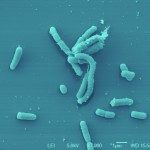Lien vers Pubmed [PMID] – 17704270
Appl Environ Microbiol 2007 Oct; 73(19): 6078-88
Listeria monocytogenes is a food-borne, opportunistic, bacterial pathogen causing a wide spectrum of diseases, including meningitis, septicemia, abortion, and gastroenteritis, in humans and animals. Among the 13 L. monocytogenes serovars described, human listeriosis is mostly associated with strains of serovars 4b, 1/2b, and 1/2a. Within the species L. monocytogenes, three phylogenetic lineages are described. Serovar 1/2a belongs to phylogenetic lineage I, while serovars 4b and 1/2b group in phylogenetic lineage II. To explore the role of gene expression in the adaptation of L. monocytogenes strains of these two major lineages to different environments, as well as in virulence, we performed whole-genome expression profiling of six L. monocytogenes isolates of serovars 4b, 1/2b, and 1/2a of distinct origins, using a newly constructed Listeria multigenome DNA array. Comparison of the global gene expression profiles revealed differences among strains. The expression profiles of two strains having distinct 50% lethal doses, as assessed in the mouse model, were further analyzed. Gene ontology term enrichment analysis of the differentially expressed genes identified differences in protein-, nucleic acid-, carbon metabolism-, and virulence-related gene expression. Comparison of the expression profiles of the core genomes of all strains revealed differences between the two lineages with respect to cell wall synthesis, the stress-related sigma B regulon and virulence-related genes. These findings suggest different patterns of interaction with host cells and the environment, key factors for host colonization and survival in the environment.







